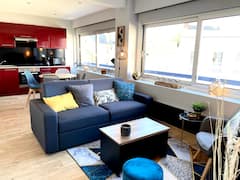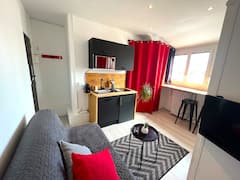When most people think of the Loire Valley, images of romantic chateaux come to mind, but not necessarily in Orléans. If you’re in the Loire Valley region, you would be remiss not to add Orléans to your travel destinations. Orleans is an interesting and important town on the banks of the Loire River which divide Orléans into two parts. To the south lies the smaller Saint-Marceau quarter, a market-gardening center. The main part of the city stands on the northern bank which contains the historic center, surrounded by pleasant wide boulevards and quays along the river. The historic center is easy to navigate and includes a large, newly paved pedestrian district with accent lighting that showcases the artisans’ and artists’ shops. The town has always had close ties with the river as its rich commercial past is tied to its past history. The architecture varies from Romanesque to half-timber houses, but there is much that is modern about Orléans. Wandering cobblestone streets you will find wine bars, Michelin starred restaurants and plenty of nightlife.
Orléans, of course, is most associated with Joan d'Arc who led the Charles VII in his battle against the English and ultimately helped defeat the English in the siege of Orléans. She was eventually captured by the English, put on trial, and burned at the stake when she was just 19. The story is very important to France and French history, and in Orléans you will see various tributes such as the statue of Joan of Arc astride a horse in the Place du Martroi, a museum in her honor, and a chance to see the house where she lived in the Place du General de Gaulle. She is remembered each year in the spring with a festival in her honor.
Read on to discover the tourist attractions present in Orléans that you have to check out during your visit.
1. Les Halles-Chatelet

Les Halls-Chatelet is located in the Place du Chatelet and was developed in the late 19th-century. Old houses and streets were demolished and a large square space was created. In 1882, food halls were added. A covered mall was built in 1977 to replace the old halls and expand the product offerings. The modern shopping arcade has men’s, women’s and children’s clothing as well as gourmet food products and wines. You can also find fresh fish and meats. Today, Les Halles-Chatelet forms the central shopping district of Orléans.
Les Halles-Chatelet
Address: Place du Châtelet, 45000 Orléans, France
Opening Hours: 8am - 7.30pm (Tuesday - Friday), 7am - 7.30pm (Saturday) and 8am - 1pm (Sunday). Closed on Mondays
Facebook: Les Halles Chatelet
2. Place du Martroi

Place Martroi is one of the main squares in Orléans, but more than geographically, it is the center of Orléans public and political life. The Maison de Ville and Chancellery are located here. Three big avenues converge in this square: Rue Bannier, Rue de la Republique and Rue Royale. In the center stands a bronze equestrian statue of Joan d'Arc atop a prancing horse. The statue was commissioned in 1803 to replace a monument to her. The statue was put in place in 1855. In a strange twist of fate, the statue was made from melted down old English cannons recovered from the Ministry of Defense. There is also a food market in the square on Friday evenings from 5 pm-9:30 pm.
Place du Martroi
Address: 4 Rue de la République, 45000 Orléans, France
Website: Place du Martroi
3. Musee des Beaux-Arts

The Musee des Beaux-Arts has one of the most beautiful collections of European art from the 18th-century to the present. There are many thousands of works, but only 700 are permanently exhibited including paintings, sculptures, and object d'art. It also houses the second largest collection of pastels behind the Louvre.
The museum is renowned for its French collections of the 17th and 18th centuries, including a part of the painted decoration of the castle of Richelieu and works of some of the greatest French artists including de La Tour, Boucher, Greuze, and de Champaigne. The Museum also has a fine collection of paintings of Italian, Flemish and Dutch, German and Spanish art. Other important artists are Delacroix, Gauguin, Picasso, and the Orleanais’ artist’s paintings (Romanticism, Realism, eclecticism, landscapes). Also, make time for the rare prints by Albrecht Dürer and a sculpture by Rodin.
Musee des Beaux-Arts
Address: 1 Rue Fernand Rabier, 45000 Orléans, France
Opening hours: Open Monday-Thursday, Saturday 10 am-6 pm; Friday 10 am-8 pm; closed Sunday
Website: Musee des Beaux-Arts (in French)
You might be interested in these Airbnbs!
4. Cathedral of Sainte Croix

The Gothic style Cathedral of Sainte Croix casts a long shadow over the Rue Joan d'Arc where it stands majestically at one end in the Place de Sainte Croix. It is the most photographed scene in the city. Building started in the early 17th-century and took almost until the end of the century to complete. The western facade has ornate stonework, towers and three rose windows. The bell tower is the highest point of the cathedral.
Inside, Orléans Cathedral follows a cruciform design with the main nave, side naves, a transept and the oratory. The stained glass windows, although more recent additions are also interesting, in particular, those that relate events from the life of Joan d'Arc. The original 13th-century cathedral was where she came for mass during the siege of Orléans. Since little of the original cathedral remains, the windows are a poignant reminder of the events and history that have shaped Orléans.
Orléans Cathedral of Sainte Croix
Address: Place Sainte-Croix, 45000 Orléans, France
5. Fetes de Joan d'Arc

For ten days, from April 29 to May 8, Orléans celebrates the Fetes de Joan d'Arc. The celebrations are in commemoration of her arrival in Orléans in spring 1429 and the eventual defeat of the English who had threatened to take the city for more than six months. The event begins with a re-enactment of Joan’s arrival in the city. “Joan” is chosen from one of the high school aged girls in Orléans. She arrives in full Medieval pageantry, parading through the streets which is something she actually did to boost morale in the last days of the siege.
The city’s historical attractions put on special exhibitions to retrace Joan’s steps through Orléans. Throughout the celebration, there are displays of Medieval prowess such as displays of falconry, sword fencing and battle re-enactments. You can enjoy a traditional Medieval drink of warm mead while watching the events. Knights on horseback charge before the cathedral to take center stage for a light show fireworks. There is also a Medieval market with jugglers, musicians and dancers.
Fetes de Joan d'Arc
Dates: Celebration Begins on April 29 with Entrance of Joan of Arc via the Burgundy gate
Website: Fetes de Joan d'Arc (in French)
6. Chateau de Chambord

With Orléans as your base, head out into the Loire Valley and visit the Chateau de Chambord, one of the most famous of the French countryside chateaus. Chambord is the largest chateau in the Loire Valley and was built as a hunting lodge for Francis I, although never finished. The chateau is an example of French Renaissance architecture, but was built as a Medieval keep with four bastion corner towers within a surrounding bailey. The chateau has about 400 rooms, more than 80 staircases, and 365 fireplaces. One of the architectural highlights is the spectacular double helix spiral staircase that is the centerpiece of the chateau. The two spirals ascend the three floors without ever meeting. It is believed that Leonardo da Vinci may have designed the staircase, but this has not been confirmed.
The roof-scape of Chambord has often been compared with the skyline of a town with eleven kinds of towers and three types of chimneys. You can walk up to the roof and walk among the towers and chimneys. The chateau is surrounded by a 13,000‑acre (5,261 hectare) wooded park and game reserve, maintained with red deer.
Chateau de Chambord
Address: Chateau, 41250 Chambord, France
Opening Hours:Open Daily 9 am-6 pm
Website: Chateau de Chambord
7. Parc Floral de al Source

The Parc Floral de la Source is an extensive area of gardens and parklands, semi-wild park where Orléans meets the countryside, which includes the ‘source’ of the Loiret River where you can actually see the river emerging from the ground. The park is divided into La Plaine du Val de Loire and the Plateau de Solonge. In the La Plaine du Val de Loire you will find several floral gardens: the iris garden, rose garden perennials garden, a dahlia garden, tropical garden, rhododendron garden, kitchen garden, and a butterfly house and aviaries. There is also the Jardin de Formes that has trees pruned in shapes of clouds. You can walk up to the Solonge Plateau where you will find a deep oak and birch forest and animal enclosures with Breton sheep and alpacas.
The gardens are listed as one of the “Remarkable Gardens of France” and are a perfect place to stroll, relax and maybe even have a picnic. A children’s playground is available and a “train” tours the site.
Parc Floral de la Source
Address: Avenue du Parc Floral, 45100 Orléans, France
Opening Hours: Hours vary by season
Website: Parc Floral de al Source (in French)
Orléans: historic at heart
At the heart of Orléans is its pedestrian friendly historic center which is one of the largest in France. Walking the cobblestone streets you are transported back through centuries of architectural history. The historical center dates back to the 15th-century and many houses and mansions can still be admired ranging from half-timber houses to 16th-century mansions. You are never far away from the ghost of Joan of Arc whom the city fetes every year. Her importance to the city’s history is not to be underestimated.
The proximity of Orléans to the Loire Valley makes it a good starting point for a visit to the area’s more than 100 chateaux. Most of them can be easily visited in a day trip. Once the stomping ground of French royalty, a visit to Orléans and the surrounding Loire Valley is a chance to immerse yourself in the best France has to offer, from history and architecture to wine and food.
History
Get Trip101 in your inbox
Unsubscribe in one click. See our Privacy Policy for more information on how we use your data
























Create an account to